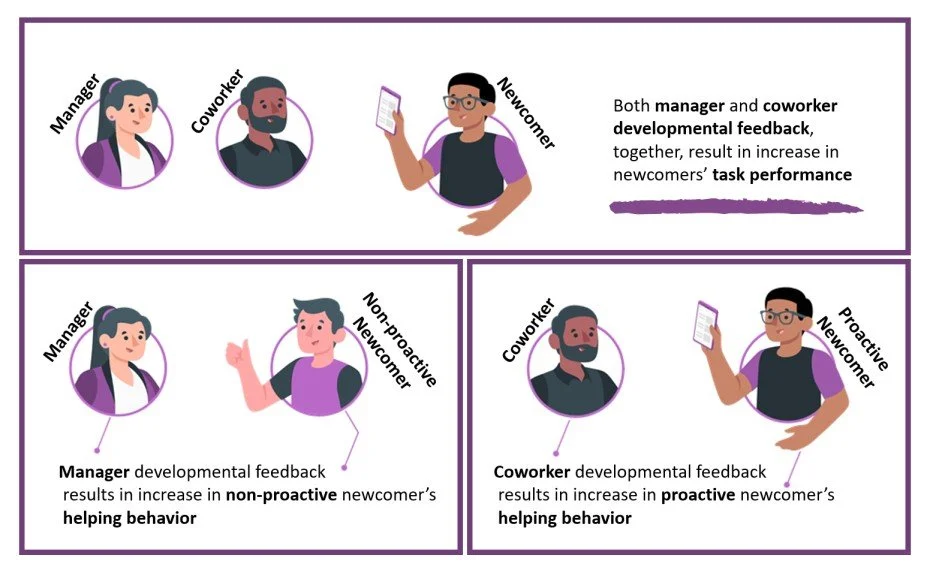Digest 31. The role of developmental feedback for newcomers’ performance
Organizations invest considerable resources to attract and recruit employees – which makes essential that organizations succeed also at retaining their newcomers and gaining positive outcomes through their behaviors and performances. On the one hand, there are formal initiatives -such as onboarding and mentoring programs- often put in places to make the transition smooth; on the other hand, the interactions newcomers have with their managers and colleagues, which are typically less formalized, have also a great impact on their organizational socialization and adaptation to the new environment. In a study by Vandenberghe and colleagues (2021), it was shown that newcomers tend to proactively seek feedback from their managers and coworkers upon their arrival. Yet, as time passes by, their feedback seeking behavior decreases which results in a decline in the information they could obtain about organizational norms and values, what is expected from them, in terms of role performance expectations. The reduction in obtaining such information deteriorates newcomers’ ability to socially adjust their behavior and integrate with others in the organization. Consequently, these result in newcomers’ weaker organizational commitment -not feeling connected nor attached to the organization-, which eventually leads to their turnover. Observing that feedback seeking behavior declines in newcomers and that it results in negative consequences, one could rightly ask what possible ways there are to prevent such negative outcomes, especially prevent their turnover; and on the opposite, how to engage newcomers so that they perform according to or exceeding expectations and engage in helping behaviors.
How to engage newcomers in helping behaviors and task performance?
As mentioned earlier, newcomers are affected by their social interactions. In this regard, Li and colleagues (2011) conducted a study collecting data from 115 newcomers and their managers working in two high-tech joint ventures in the field of IT and manufacturing in China, and found that the developmental feedback newcomers receive from their managers or coworkers help them engage in helping behaviors. Particularly, developmental feedback from both managers and coworkers is needed to help newcomers increase their task performance. What is meant by developmental feedback is the helpful and useful information given to employees/newcomers which enables them to learn, develop, and improve their job performance (check out Digest 3 for more details on high-quality feedback).
Moreover, Li and colleagues (2011) found that those newcomers who have proactive personality, in other words those who naturally take personal initiatives, will engage more in helping behaviors when they receive feedback from their coworkers. On the contrary, those who are not proactive would engage more in helping behaviors when their managers provide them with developmental feedback.
Organizational implications
The following suggestions might help organizations enhance newcomers’ performance and boost helping behaviors in them:
For those newcomers who do not engage in feedback seeking or those whose feedback seeking behavior decline over time (find out more on individual characteristics and feedback seeking behavior in Digest 9), managers’ and coworkers’ developmental feedback could be a good substitute to enhance newcomers’ performance and prevent the decline in their organizational commitment and increase in turnover. Therefore, managers and coworkers should be encouraged to provide developmental feedback to newcomers.
When providing developmental feedback, managers need to consider the personality of newcomers. If managers want to reinforce a collaborative culture and increase helping behaviors, they need to especially provide developmental feedback to those newcomers who are less proactive; and encourage coworkers to provide feedback to those newcomers who are more proactive.
Organizations need to involve coworkers in formal socialization and mentoring initiatives designed for newcomers, as this maximizes the possibility of strengthening also informal interactions together with the opportunities to provide feedback (for more benefits of coworkers’ feedback have a look at Digest 19).
Considering that feedback seeking tends to decline over time, it is of the utmost importance to give high-quality developmental feedback to newcomers: this would reinforce the culture of continuous feedback and therefore prevent them from stopping to seek feedback (see Digest 23 on how and why feedback quality matters for feedback seeking).
——
References:
Li, N., Harris, T. B., Boswell, W. R., & Xie, Z. (2011). The role of organizational insiders’ developmental feedback and proactive personality on newcomers’ performance: An interactionist perspective. Journal of Applied Psychology, 96(6), 1317–1327. https://doi.org/10.1037/a0024029
Vandenberghe, C., Landry, G., Bentein, K., Anseel, F., Mignonac, K., & Roussel, P. (2021). A dynamic model of the effects of feedback-seeking behavior and organizational commitment on newcomer turnover. Journal of Management, 47(2), 519–544. https://doi.org/10.1177/0149206319850621

